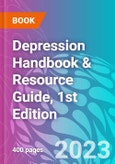This new title is designed to bring together necessary and valuable information for anyone struggling with depression - one of the most common mental health illnesses in the United States - including family and friends of individuals who are suffering from depression and related mental health issues.
For those providing care and support to individuals with depression, this resource provides easy-to-understand and helpful information and connects readers to many sources of support. Depression Handbook & Resource Guide offers statistics, both national and state, as well as discussions about prevention, treatment, and outcomes. It includes details on the major types of depression, including persistent depressive disorder, postpartum depression, psychotic depression, seasonal affective disorder, and bipolar disorder.
- Studies & Statistics About Depression: This four-color section is more than 300 pages and includes detailed reports, maps, graphs and tables from sources such as the U.S. Department of Health & Human Services, Centers for Disease Control and the National Institutes of Health. Coverage is current, comprehensive, and discusses the prevalence of depression, causes, treatments, and co-existing conditions.
- Depression & Mental Health Resources: This section includes several chapters, with resources on depression specifically, and mental health generally. Each chapter begins with an informative description, and goes on to include a variety of resources for patients, their families and caregivers.
- Complications of Depression: This section details numerous health conditions that can occur as a result of untreated, serious depression, including effects on the central nervous system, digestive system, and cardiovascular and immune systems.
- Additional sections include Glossary, Entry Index, and Geographic Index.
The Depression Handbook & Resource Guide is a necessary reference for public and academic libraries, as well as health care collections, providing information crucial to sufferers of depression, their broader support network, case workers, social workers, and other health care providers.








